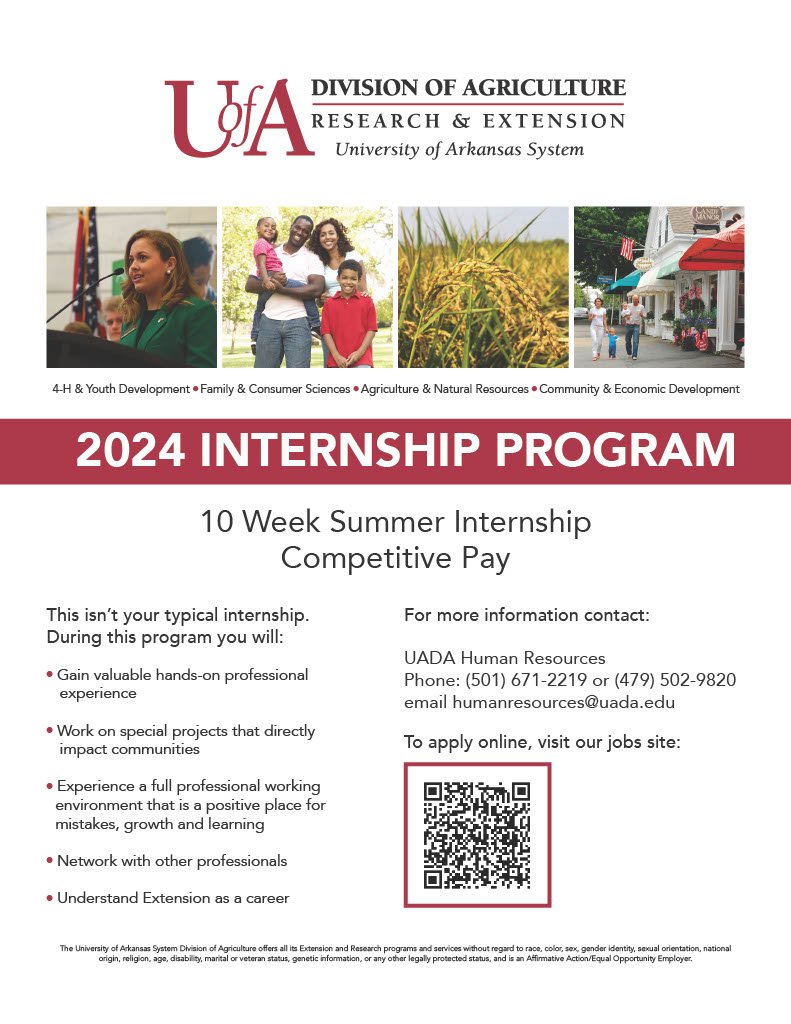By Rebekah Hall
U of A System Division of Agriculture
LITTLE ROCK — For college students, internships provide important hands-on training in their field of study. In 2024, students at Arkansas colleges and universities will have the opportunity to dive deep into three focus areas and work with mentors as part of the Cooperative Extension Service’s new Experiential Scholars Program.
SEEKING SCHOLARS — The Cooperative Extension Service will offer a new internship opportunity in Summer 2024 for college students looking for hands-on training in water/soil conservation, food safety/nutrition and health and community and economic development. (Division of Agriculture flyer.)
“Internships have been shown over and over again to provide many different benefits for participants and organizations,” said Julie Robinson, extension associate professor of leadership for the University of Arkansas System Division of Agriculture. “It helps participants gain real-life work experiences, it helps them decide if they want to work for the organization, and it helps organizations provide those experiences and hopefully onboard some potential future employees.”
Robinson said the program is funded through a $750,000 grant from the U.S. Department of Agriculture’s National Institute of Food and Agriculture.
Experiential Scholars Program interns will focus on one of three areas: water/soil conservation, food safety/nutrition and health, or community and economic development. The inaugural program will begin May 20, 2024, and end July 19, 2024. Students can apply at bit.ly/ces-esp-app.
During the nine-week paid summer internship, participants will work with extension mentors. Robinson said faculty in family and consumer sciences, crop, soil and environmental science and community, professional and economic development will serve as the primary mentors for the program, though others may be included in the future.
“Students will work alongside subject matter faculty members and specialists,” Robinson said. “They’ll get to travel around the state, deliver educational programming, plan research and demonstrations, and really shadow and learn from their mentors. They’ll learn more about that specific area of research and focus.”
Recruiting from 1890 institutions
The $750,000 in funding for the program, which covers a five-year grant cycle, will include the cost of interns’ salaries, travel and lodging. Robinson said the goal is to recruit seven students for each year of the grant cycle. Students will be based in or near central Arkansas because they will be traveling often with their extension mentors, whose offices are housed at the extension Little Rock State Office.
The program will recruit applicants from Arkansas colleges and universities and those from surrounding areas, with an emphasis on historically black institutions included in the 1890 land-grant system, which were established under the Second Morrill Act of 1890.
“We will definitely be trying to heavily recruit from the University of Arkansas at Pine Bluff, potentially even in other states with 1890 institutions,” Robinson said.
Robinson said that in addition to providing scholars with career readiness and leadership skills, the Experiential Scholars Program will also help raise awareness of extension’s mission in the state and develop the next generation of future employees or volunteers.
“Even if the interns who come into this program decide that extension or the Division of Agriculture is not for them, we’ve at least trained people who will understand the programming that we offer,” Robinson said. “They may be future volunteers through Master Gardeners, 4-H, or our Extension Homemakers program, or they may participate in the LeadAR program in the future.
“I love the idea that we will have advocates for the division who understand what we do and can share with those in their community about what a great resource extension is,” she said.
Applications for the program are open, and students can apply at bit.ly/ces-esp-app. For more information about the Experiential Scholars Program, visit the program’s page on the Cooperative Extension Service website or contact Robinson at jrobinson@uada.edu.
The Cooperative Extension Service is the outreach and education arm of the University of Arkansas System Division of Agriculture.
To learn about extension programs in Arkansas, contact your local Cooperative Extension Service agent or visit www.uaex.uada.edu. Follow us on Twitter and Instagram at @AR_Extension. To learn more about Division of Agriculture research, visit the Arkansas Agricultural Experiment Station website: https://aaes.uada.edu. Follow on Twitter at @ArkAgResearch. To learn more about the Division of Agriculture, visit https://uada.edu/. Follow us on Twitter at @AgInArk.


